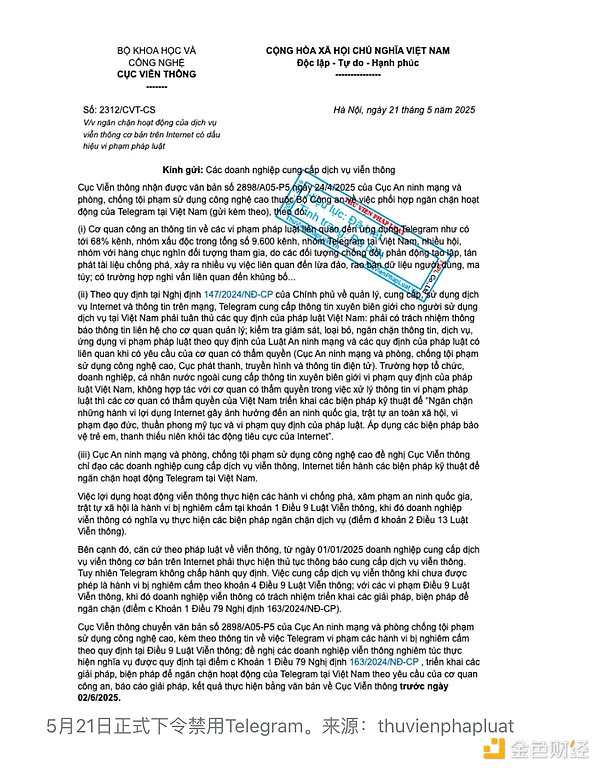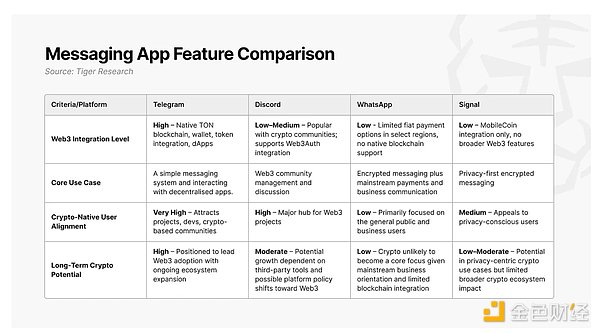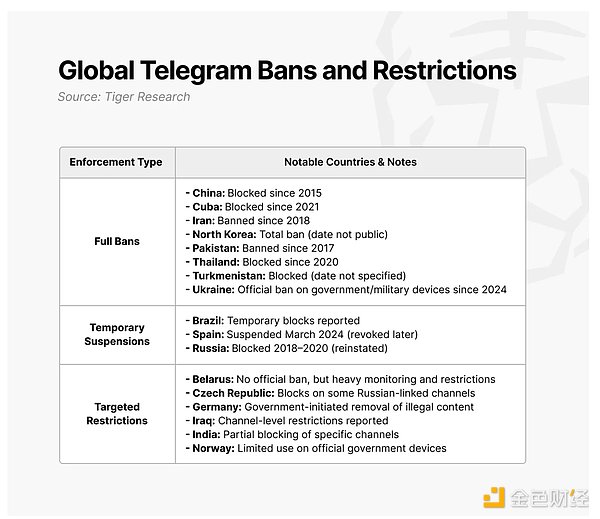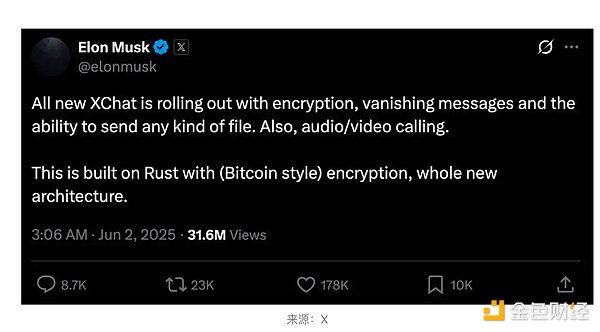Author: Chi Anh, Ryan Yoon Source: Tiger Research Translation: Shan Ouba, Golden Finance
Abstract
Platform Dependency Risk Exposure: In June 2025, Vietnam banned Telegram, causing a 45% drop in user activity in major crypto communities within a few days. This incident highlights a key structural vulnerability: the crypto industry is highly dependent on an irreplaceable communication platform.
Irreplaceable Platform: Although Discord, Signal, and local chat applications have been tried to replace Telegram, they have not been able to replicate its unique combination of global coverage, privacy protection, and "crypto-native" user experience. No other platform can currently match it in scale.
Global regulatory pressure is rising: Citing "digital sovereignty", governments around the world are stepping up their scrutiny of Telegram, especially its stance against data sharing and surveillance. However, Telegram has recently begun to cooperate with regulation in some jurisdictions, temporarily alleviating concerns in some key markets.
1. Telegram's core role in the crypto market
Telegram has become the main communication platform for the global crypto community. Its strong privacy protection, scalable large group chat function, and Bot integration make it the first choice for KOLs and new projects to build communities. Market participants generally use Telegram as the main interaction channel.
Today, Telegram is deeply integrated into the infrastructure of the crypto market. People are used to its existence, but just imagine a conference like Token2049 without Telegram - attendees can only exchange LinkedIn information, the scene seems extremely unnatural. It can be said that it is difficult to imagine a crypto ecosystem without Telegram now.
2. Vietnam completely bans Telegram

On May 21, 2025, at the request of the Vietnamese Ministry of Public Security, the Ministry of Information and Media issued Order No. 2312/CVT-CS, requiring all telecommunications service providers to completely block Telegram by June 2.
This move immediately disrupted Vietnam's encryption ecosystem. Vietnam is one of the countries with the largest number of Telegram users, and its local crypto industry also relies heavily on the platform as the primary communication channel. After the ban, local crypto projects and users have found few viable alternatives. Although many people have turned to VPNs to barely maintain access, this method is at best a temporary and unstable remedy. For ordinary users who are only moderately interested in encryption, accessing Telegram through VPN is too cumbersome, which ultimately leads to a large number of users leaving directly. In just a few days, the average views of the top ten mainstream crypto communities in Vietnam fell by more than 45%.

In response, community organizers began to experiment and promote alternative platforms. Activity on Vietnamese servers on Discord has increased dramatically, and some communities have also tested local chat tools such as Zalo, hoping to meet users' needs for lightweight and simple interfaces.
However, no alternative platform can reproduce Telegram's unique balance of usability, privacy protection, and encryption native features. Despite the ban, most users still rely on VPNs to use Telegram - a roundabout way to save the country, but by no means a fundamental replacement.
3. Are there any viable alternatives to Telegram?

The regulatory pressure on Telegram reveals a structural vulnerability in the crypto industry: a high degree of reliance on a single communication platform.
As shown in the case of Vietnam, the first reaction after the ban was the massive use of VPNs. Although this is a short-term stopgap measure, it brings considerable barriers to use for ordinary users. Although institutional investors' participation in the crypto market is increasing, retail investors still account for a significant proportion of market activities. At a time when the entire market is trying to break through the early user circle and achieve mass adoption, dependence on Telegram has become an obstacle to further development.
Therefore, the industry has begun to actively seek alternative platforms. Discord has become the first choice for many communities in Vietnam. It supports real-time communication and is developer-friendly. However, it lacks the simple "mobile first" experience that Telegram has. Another candidate, Signal, is known for its strong security features, but its tool support in "crypto-native" use cases is limited, so it is still difficult to become a complete substitute.

Other communication software such as Zalo or WhatsApp are usually limited to users in a specific region, which is naturally inconsistent with the global cross-border communication required by the encryption ecosystem.
In the final analysis, the encryption industry has not yet found a true alternative to Telegram. Telegram's technical advantages such as anonymity, privacy, and Bot integration have further consolidated its dominant position, and the root of the problem lies in the structural deficiency:
There is currently no communication platform that is widely adopted globally and can operate seamlessly across borders. Since users in different countries have different communication preferences, it is still a huge challenge to find a unified platform that can meet the global needs of the entire crypto ecosystem.
Telegram plays a unique role in the field of communications: it does not dominate any national market, nor is it the primary application for most people, but it is often the "second choice" in multiple regions. This "secondary but widespread" usage status gives Telegram a de facto cross-regional neutrality, and it is this "regional independence" that makes it almost difficult to replace.
4. Telegram faces growing regulatory risks
Although there is no viable alternative to Telegram at present, governments, including Vietnam, are increasing their supervision of it in the name of "digital sovereignty".
The main reason is that Telegram adheres to a strong privacy policy and generally refuses to share user data with governments, with only exceptions in a few major jurisdictions. For most governments, the inability to monitor encrypted communications on Telegram remains a core issue.

These concerns are gradually evolving into actual regulatory actions. Countries have adopted three strategies to restrict Telegram:
Full ban and promotion of local alternative platforms;
Temporary blocking, usually due to specific events (such as legal violations or improper communication during elections);
Selective filtering, which allows access to Telegram but blocks specific channels or limits their speed.
These precedents suggest that more restrictions may be introduced in the future. Several countries are evaluating full or partial bans on Telegram. Although the political reasons for bans vary from country to country, the regulatory paths are increasingly converging: national security, non-compliance with local laws, or risks to public order have become the three major grounds for government pressure.
Against this backdrop, Telegram’s response strategy is becoming a key variable. Although the trigger points vary from country to country, the core issue is that Telegram is unable or unwilling to meet local compliance requirements. In countries with stricter regulatory environments, the government’s tolerance for “uncooperative platforms” is significantly lower.
However, Telegram’s attitude has softened somewhat. Since the arrest of CEO Pavel Durov, the company has begun taking steps to improve its compliance image. For example, its recently released transparency report disclosed the IP addresses and phone numbers of some violators—although only in jurisdictions with strong democratic systems.
Although these measures are limited in scope, Telegram is clearly more willing to respond to government requests than in the past. This change is expected to reduce the risk of immediate sanctions in key markets such as the United States.
5. What happens if Telegram is completely banned?
Although the possibility of a global ban on Telegram is low, the concerns of governments are growing. If this scenario does happen, the initial reaction of users may be similar to that of Vietnam: a large number of users flock to VPNs. But as mentioned above, this is only a short-term remedy, not a long-term solution.

If Telegram is completely banned, users will begin to migrate to alternative services. As mentioned earlier, platforms with "regional neutrality" attributes will be more likely to be widely adopted rather than some clones or localized chat tools with similar functions.
Signal is a potential candidate, with significant recent user growth, but a stronger competitor may be XChat, the upcoming messaging service from X (formerly Twitter). Due to X's deep integration in the crypto community, XChat may be able to quickly cut in with its existing user base.
However, the more immediate risk is the potential damage to the TON Foundation. Although Telegram and TON are officially independent, the two are closely related. Many Telegram-native T2E (Talk-to-Earn) games have driven the development of the TON ecosystem, and the seamless integration of the TON wallet with Telegram is also a major advantage.
Therefore, the spread of policies to ban Telegram has turned this deep binding into a risk point: once access is cut off, user acquisition and transaction flow of TON-integrated applications will be immediately affected. Even if the underlying blockchain is still operating normally, the market's perception of Telegram and TON as "one" will bring reputation and operational risks.
Although the possibility of Telegram being banned globally is still low, the entire crypto industry must face a reality: Viable alternatives are extremely limited. From a broader perspective, the core infrastructure of the crypto ecosystem not only relies on Telegram, but also has multiple "single point risks". If these structural loopholes are not resolved, the entire industry will always face the threat of sudden external shocks.
The direction of the future is already very clear: Reducing over-dependence and promoting platform diversification is no longer a choice, but a survival strategy.
 Catherine
Catherine









